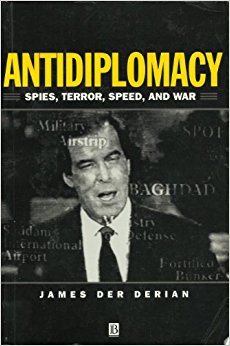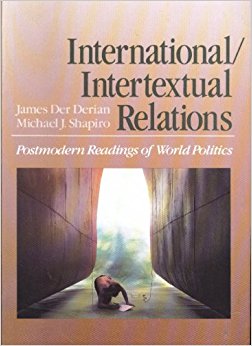Background
Mr. Der Derian was born in the United States on January 12, 1955. He was a son of Arthur Rebel and Betty Ann (Moyer) Der Derian.

(Critical Practices in International Theory brings togethe...)
Critical Practices in International Theory brings together for the first time the essays of the leading IR theorist, James Der Derian. The essays cover a variety of issues central to Der Derian's work including diplomacy, alienation, terrorism, intelligence, national security, new forms of warfare, the role of information technology in international relations, poststructuralist theory, and the military-entertainment-media matrix. The book includes a framing introduction written for this volume in which Der Derian provides historical and theoretical context for a diverse body of work. Discussing his own influences and reflecting upon the development of international theory, he advocates a critical pluralist approach to the most pressing problems of world politics. Written in the eloquent style that marks out Der Derian as one of the most provocative and innovative thinkers in international relations, this collection is essential reading for scholars and students interested in the past, present and future of international relations. James Der Derian is a Watson Institute research professor of international studies at Brown University, where he directs the Global Security Program and the Global Media Project. He is the author of many articles and books, including the highly acclaimed Virtuous War (2001, 2009).
http://www.amazon.com/gp/product/0415772419/?tag=2022091-20

(In the Mojave Desert, off the shores of San Francisco Bay...)
In the Mojave Desert, off the shores of San Francisco Bay, in the hills of southern Germany, next door to Disneyworld and in the heart of Hollywood, the United States armed forces are preparing for the next war. They are fought by the military in the same manner as they are viewed by citizens, on real-time networks and by live-feed videos, on the PC and the TV, actually and virtually. Enabled by smart technologies yet constrained by political and humanitarian imperatives, a new form of high-tech, low-risk warfare is emerging, Virtuous War . In Virtuous War , James Der Derian takes the reader on a roadtrip through the future of war, where cyborg combat technologies, video games, TV news stories, Army training exercises, and Hollywood movies all blur and converge in a new military-industrial-media-entertainment network. He shows us a world in which CNN and Disney are as much a part of the battlefield as Lockheed Martin and the Pentagon, where Marine fire-teams train with the video game Doom”, and entertainment executives design Army wargames. All the while Der Derian offers tremendous insight on the questions that arise as the tail of technology wags the dog of war: Will killing become easier? Will peace become harder? Will war lose its place as the ultimate reality-check of international politics? The result is the first book to offer a virtual theory” for the military strategies, philosophical questions, ethical issues, and political controversies surrounding the future of war and peace. In the Mojave Desert, off the shores of San Francisco Bay, in the hills of southern Germany, next door to Disneyworld and in the heart of Hollywood, the United States armed forces are preparing for the next war. They are fought by the military in the same manner as they are viewed by citizens, on real-time networks and by live-feed videos, on the PC and the TV, actually and virtually. Enabled by smart technologies yet constrained by political and humanitarian imperatives, a new form of high-tech, low-risk warfare is emerging, Virtuous War . In Virtuous War , James Der Derian takes the reader on a roadtrip through the future of war, where cyborg combat technologies, video games, TV news stories, Army training exercises, and Hollywood movies all blur and converge in a new military-industrial-media-entertainment network. He shows us a world in which CNN and Disney are as much a part of the battlefield as Lockheed Martin and the Pentagon, where Marine fire-teams train with the video game Doom”, and entertainment executives design Army wargames. All the while Der Derian offers tremendous insight on the questions that arise as the tail of technology wags the dog of war: Will killing become easier? Will peace become harder? Will war lose its place as the ultimate reality-check of international politics? The result is the first book to offer a virtual theory” for the military strategies, philosophical questions, ethical issues, and political controversies surrounding the future of war and peace.
http://www.amazon.com/gp/product/0813397944/?tag=2022091-20

(This book plots a trajectory from the beginning of the Se...)
This book plots a trajectory from the beginning of the Second Cold war to the end of the Gulf War, to show how new global forms and representatives of spying, speed, and terror have both fortified the national security state and generated an antidiplomacy. Because the new technologies of power behind antidiplomacy are transparent and pervasive, through the exchange of signs not goods, they have proven to be resistant if not invisible to the traditional methods of International Relations.
http://www.amazon.com/gp/product/155786344X/?tag=2022091-20

(In a world in which the need for effective diplomacy is m...)
In a world in which the need for effective diplomacy is more urgent than ever, this brilliant examination of the intellectual origins of western diplomacy deploys the work of key thinkers such as Foucault, Hegel, Nietzche and Marx to show how the origins and transformations of diplomacy are related to conditions of alienation, and attempts to mediate through law, thought and communications. James Der Derian presents a highly sophisticated intellectual argument which will attract a great deal of attention in academic fields on both sides of the Atlantic.
http://www.amazon.com/gp/product/0631154868/?tag=2022091-20

(Drawing on the philosophies and intellectual approaches o...)
Drawing on the philosophies and intellectual approaches of numerous contemporary social critics (Nietzche, Foucault, Barthes, among others), this collection sheds light on the relationship between international theory and political power. Using such disciplines as geneaology, deconstruction, semiotics, feminist psychoanalytical theory, and intertextualism, these readings address such diverse topics as: sovereignty, terrorism, the psychology of war, nuclear criticism, strategic culture. Annotation c. Book News, Inc., Portland, OR (booknews.com)
http://www.amazon.com/gp/product/0669189553/?tag=2022091-20
Mr. Der Derian was born in the United States on January 12, 1955. He was a son of Arthur Rebel and Betty Ann (Moyer) Der Derian.
James Der Derian graduated from McGill University with Bachelor of Arts (with first class honors) in 1978. In 1981 he obtained Master of Philosophy degree and in 1983 Doctor of Philosophy from Balliol College, Oxford.
Mr. Der Derian served at University of Massachusetts at Amherst as a professor of political science since 1984. From 1982 to 1983 he held the post of a lecturer at Oxford University, and in 1995 he became a visiting fellow of St. Antony’s College. In 1984 he was appointed lecturer at Columbia University.
During 1986-1991 James Der Derian worked as a teacher at Gardner and Lancaster State Prisons. In 1988 he joined University of Southern California as a senior research fellow at Center for International Studies. Between 1991 and 1992 Mr. Der Derian acted as a visiting scholar at Center for International Studies at Massachusetts Institute of Technology.
Later he was a guest lecturer at colleges and universities in the United States and abroad, including University of Wales, Norwegian Institute of International Affairs, London School of Economics and Political Science, University of the Andes, Dalhousie University, University of Chicago, Vanderbilt University, University of Toronto, Princeton University, and University of California, Santa Cruz.
During the period of 1985-1990 James Der Derian acted as a producer and moderator of a radio and television series Great Decisions, broadcast by college and community networks. He was a consultant to 60 Minutes, guest on television and radio programs in the United States and Australia. Starting from 1992 he has been a member of editorial board University of Massachusetts Press. In 1990 he became a member of Rhodes Scholar Selection Committee.
He was a contributor to books, including Reimagining the Natton, Espionage: Past, Present, Future?, Cultures on the Brink: Ideologies of Technologies. Member of editorial board, "Culture and Power in a Globalized World" (a book series), Westview (Boulder, CO), 1995. Contributor of articles and reviews to periodicals, including Wired, intelligence and National Security Journal, Columbia ilm Review, Newsday, Radical America, International Studies Quarterly, and Social Text.
(In a world in which the need for effective diplomacy is m...)
(This book plots a trajectory from the beginning of the Se...)
(Drawing on the philosophies and intellectual approaches o...)
(In the Mojave Desert, off the shores of San Francisco Bay...)
(Virtuous War is the first book to map the emergence and j...)
(Critical Practices in International Theory brings togethe...)
